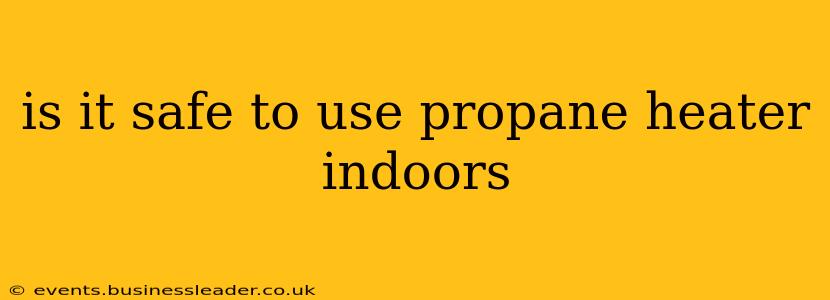Is it Safe to Use a Propane Heater Indoors? A Comprehensive Guide to Indoor Propane Heater Safety
Using a propane heater indoors can be a tempting way to stay warm, especially during power outages or in unheated spaces. However, it's crucial to understand that using propane heaters indoors is generally unsafe and potentially life-threatening without the proper precautions and ventilation. Carbon monoxide poisoning is a significant risk, and improperly used propane heaters can lead to fires and explosions.
This guide will explore the safety concerns surrounding indoor propane heater use, address common questions, and provide guidelines to minimize risks if you must use one.
What are the dangers of using a propane heater indoors?
The primary danger is carbon monoxide (CO) poisoning. Propane heaters burn propane, and incomplete combustion can produce significant amounts of CO, a colorless, odorless, and deadly gas. Inhaling CO can lead to headaches, dizziness, nausea, and even death. The symptoms can be subtle initially, making it difficult to recognize the danger.
Beyond CO poisoning, improperly installed or maintained propane heaters pose a fire risk. Leaks can lead to explosions, and overheating components can ignite nearby flammable materials.
What kind of propane heater is safest for indoor use?
There is no truly "safe" propane heater for indoor use unless it is specifically designed and certified for indoor use with the proper ventilation. Even then, extreme caution is necessary. Many propane heaters are designed exclusively for outdoor use. Using an outdoor heater inside can lead to rapid CO buildup.
If you must use a propane heater indoors, prioritize a vented model. Vented heaters are designed to exhaust combustion byproducts outside, significantly reducing the risk of CO poisoning. However, proper venting is critical, and incorrect installation can negate the safety benefits.
Can you use a propane heater in a garage?
No, using a propane heater in a garage is extremely dangerous. Garages often have poor ventilation, and the enclosed space allows CO to build up rapidly. Furthermore, garages typically contain flammable materials like gasoline, paint, and motor oil, increasing the risk of fire.
How can I make my propane heater safer to use indoors?
Minimizing the risks associated with indoor propane heater use requires a multi-pronged approach:
- Proper Ventilation: Ensure adequate ventilation by opening windows and doors to allow fresh air to circulate and exhaust fumes to escape. This is essential even with vented heaters.
- CO Detectors: Install and regularly test battery-operated carbon monoxide detectors on every level of your home, including near the heater. These detectors can provide crucial early warning of dangerous CO levels.
- Regular Maintenance: Have your propane heater inspected and serviced annually by a qualified technician. This helps identify and address potential problems before they lead to accidents.
- Proper Installation: If using a vented heater, ensure it is correctly installed according to the manufacturer's instructions. Improper installation can render the venting system ineffective.
- Never leave a propane heater unattended: Always turn off the heater when you leave the room or go to sleep.
- Keep flammable materials away: Maintain a safe distance between the heater and any flammable materials.
What are the signs of carbon monoxide poisoning?
Symptoms of CO poisoning can be subtle at first and mimic the flu:
- Mild headache
- Dizziness
- Weakness
- Nausea
- Vomiting
- Shortness of breath
- Confusion
If you suspect CO poisoning, immediately evacuate the premises and seek fresh air. Call emergency services immediately.
Are there safer alternatives to propane heaters for indoor use?
Yes, several safer alternatives exist for indoor heating:
- Electric heaters: These are generally safer than propane heaters, but it's important to choose models with safety features like automatic shutoff.
- Natural gas heaters (with proper ventilation and installation): While still carrying some risks, properly installed and vented natural gas heaters are often considered safer than propane counterparts, providing they meet local building codes and are regularly serviced.
- Wood-burning stoves (with proper ventilation and installation): Similar to gas heaters, careful installation and regular cleaning are vital for safety.
In conclusion: While propane heaters can provide warmth, their indoor use is inherently risky. Prioritizing safety through proper ventilation, CO detectors, regular maintenance, and considering safer alternatives is crucial to avoiding potentially fatal consequences. If you have any doubts or concerns, consult a qualified heating professional.
